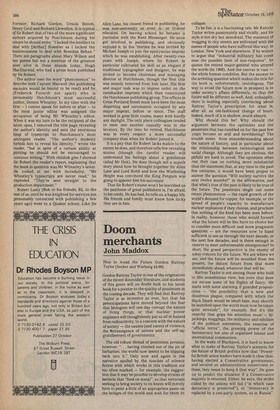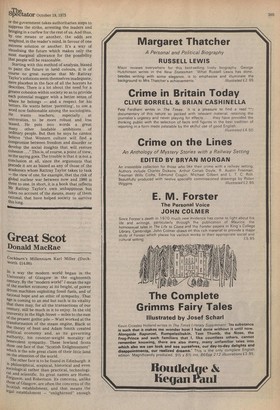Doom merchants
John Maddox
How to Avoid the Future Gordon Rattray Taylor (Seeker and Warburg £4.90)
Gordon Rattray Taylor is one of the originators of the recent doomsday literature, and students of this genre will no doubt look to his latest book for a pointer to the quality of pessimism in the coming decade. They will find that Rattray Taylor is as inventive as ever, but that his preoccupations have moved beyond the fear that biologists will one day corrupt the nature of living things, or that nuclear power engineers will thoughtlessly put us all in hazard from radioactivity, to a concern with the nature of society — the causes (and cures) of violence, the intransigence of unions and the self-aggrandisement of governments.
The old robust thread of pessimism persists, however: ". . . having climbed out of the pit of barbarism, the world now seems to be slipping back into it." Only now and again is the narrative spoiled by the touches of science fiction with which works in this tradition are too often marked — for example, the suggestion that it may be possible to develop strains of bacteria that "feed on metal", so that terrorists seeking to bring society to its knees will merely have to paint a little of an appropriate paste on the bridges of the world and wait for them to collapse.
To be fair, it is a fascinating tale. Mr Rattray Taylor writes passionately and vividly, and his style is not dry but anecdotal. The statistics of mugging in city streets are enlivened with the names of people who have suffered this way, in London, New York and elsewhere. If he wishes to argue that "industrial militancy has come near the possible limit of non-response", he quotes the retired major-general who uttered the words (in 1968). And the canvas is vast — the whole human condition. But the answer to the arresting question which makes the title for the book is, unfortunately, tautologous. The way to avoid the future now in prospect is to order society's affairs differently, so that the future will be different as well. And, unhappily, there is nothing especially convincing about Rattray . Taylor's prescription for what is, after all, an old-fashioned change of heart. Indeed, much of it is shallow, much absurd.
Why should this be? Why should the argument between the optimists and the pessimists that has rumbled on for the past few years become so arid and bewildering? The trouble stems from misunderstanding about the nature of history, and in particular about the relationship between technological and social change. Although they are obvious, the pitfalls are hard to avoid. The optimists often rest their case on nothing more substantial than the statement that, at any time in the past few centuries, it would have been proper to answer the question "Will society survive the next twelve months?" in the affirmative, and that what's true of the past is likely to be true of the future. The pessimists single out some recent phenomenon — the rapid growth of the world's demand for copper, for example, or the spread of people's capacity to manufacture nuclear explosives if they choose, and proclaim that nothing of the kind has been seen before. In reality, however, those 'who would foretell what the future will be like have no choice but to consider more difficult and more pragmatic questions — are the resources now to hand sufficient to see us through the next decade, or the next few decades, and is there enough in reserve to meet unforeseeable emergencies? In short, the grand perspective is the enemy of sober concern for the future. We are where we are, and the future will be moulded from the present, the distant future from that more immediately ahead, whatever that will be.
Rattray Taylor is not among those who hold to this unambitious view, but even that does not excuse some of his flights of fancy. He starts with some alarming if guarded propositions — "the possibility that a new and disastrous plague, compared with which the Black Death would be small beer, may shortly be launched upon the world must now be taken quite seriously", for example. But it's the anarchy that grips his attention most — hijackings, muggings, the militancy and nihilism of the political extremists, the exercise of "official terror", the growing power of the bureaucracy but also of organised labour and international communism, In the wake of Blackpool, it is hard to know what to make of Rattray Taylor's scenario for the future of British politics now that "Powerful British union leaders have made it clear that, having ejected a Conseryative government, and secured an administration subservient to them, they mean to keep it that way". He goes on to predict the situation if a Conservative majority is returned. Either, he says, the strike called by the unions will fail ("in which case democracy is preserved"), or "democracy is replaced by a one-party system, as in Russia"
or the government takes authoritarian steps to suppress the strike, arresting the leaders and bringing in a curfew for the rest of us. And thus, by one means or another, the odds are weighted, in the reader's mind, in favour of one extreme solution or another. It's a way of visualising the future which makes only the most marginal allowance for the possibility that people will be reasonable.
Starting with this method of analysis, biased to paint the future in lurid colours, it is of course no great surprise that Mr Rattray Taylor's solutions seem themselves inadequate, mere placebos in the face of all the horrors he describes. There is a lot about the need for a greater cohesion within society so as to provide each potential mugger with a better sense of Where he belongs — and a respect for his betters. He wants better 'parenting', to use a word now fashionable among the sociologists. He wants teachers, especially at universities, to be more robust and less biased. He puts into words a great many other laudable ambitions of ordinary people. But then he says he cannot believe "that Western culture will find a compromise between freedom and disorder or develop the social insights that will restore cohesion ..." This is, of course, a point of view, as the saying goes. The trouble is that it is not a conclusion at all, since the arguments that precede it are as biased as any of those of the academics whom Rattray Taylor takes to task -the View of one, for example, that the risk of global nuclear war between now and 1980 is three to one. In short, it is a book that reflects Mr Rattray Taylor's own unhappiness but takes no account of the means, many of them rational, that have helped society to survive this long.



































 Previous page
Previous page